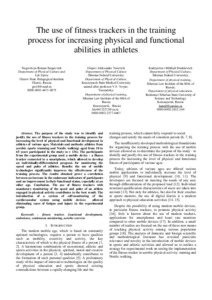The use of fitness trackers in the training process forincreasingphysical and functional abilities in athletes
Скачать файл:
URI (для ссылок/цитирований):
https://www.atlantis-press.com/proceedings/icistis-19/125922477https://elib.sfu-kras.ru/handle/2311/143400
Автор:
Nagovitsyn, R. S.
Osipov, A. Yu.
Kudryavtsev, M. D.
Коллективный автор:
Институт физической культуры, спорта и туризма
Кафедра физической культуры
Дата:
2019Журнал:
Advances in Health Sciences ResearchКвартиль журнала в Web of Science:
без квартиляБиблиографическое описание:
Nagovitsyn, R. S. The use of fitness trackers in the training process forincreasingphysical and functional abilities in athletes [Текст] / R. S. Nagovitsyn, A. Yu. Osipov, M. D. Kudryavtsev // Advances in Health Sciences Research. — 2019. — Т. 17. — С. 150-155Аннотация:
The purpose of the study was to identify and justify the use of fitness trackers in the training process for increasing the level of physical and functional development in athletes of various ages. Materials and methods: athletes from aerobic sports (running and Nordic walking) aged from 18 to 65 years participated in the study (n = 136). The participants from the experimental group used a mobile device - a fitness tracker connected to a smartphone, which allowed to develop an individually-differentiated program for monitoring the speed and pulse of athletes. Results: the use of mobile technologies significantly improves the effectiveness of the training process. The results obtained prove a correlation between an increase in the endurance indicators of participants and an improvement in their functional status, especially at an older age. Conclusion. The use of fitness trackers with mandatory monitoring of the speed and pulse of an athlete engaged in physical activity contributes to the best result. The introduction of a system of self-monitoring of the cardiovascular system using mobile devices allowed eliminating cases of fatigue and injury in the experimental group.

